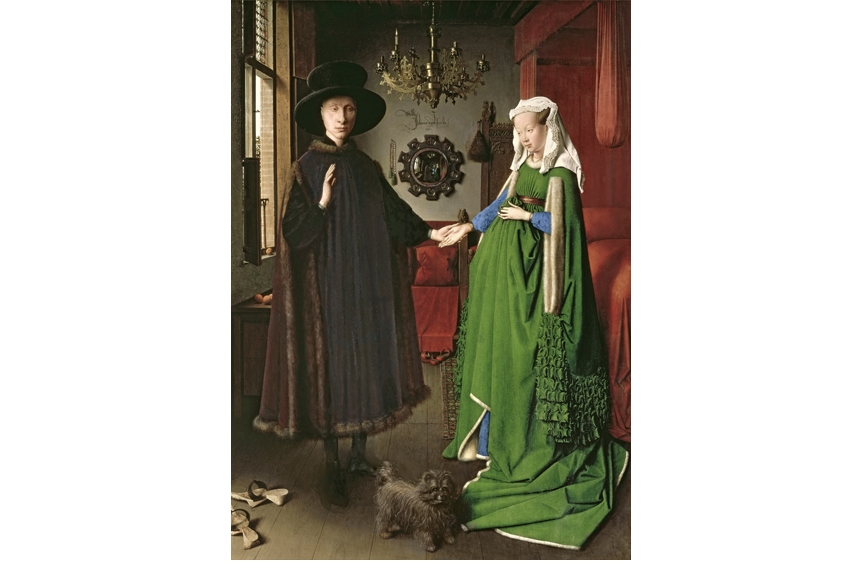Carola Hicks was an acclaimed art historian, and, as she phrased it, a biographer of objects, exploring the ‘lives’ of art-historical subjects from the Bayeux tapestry to the stained-glass windows of King’s College Chapel, and now Jan van Eyck’s ‘Arnolfini Wedding Portrait’, deftly weaving together the history of the times in which the objects were created, art-historical analysis and a study of their afterlife, both how the pieces were treated by successive generations and what the cultural resonances of those treatments might tell us today.
‘The Arnolfini Wedding Portrait’, painted by Jan van Eyck in 1434, may or may not be a portrait of a couple named Arnolfini, and may or may not commemorate their wedding, but it is certainly one of the greatest and most famous works of art of all times. Tiny (it measures only 32 x 23 inches), it conveys a mysterious sense of otherness; at the same time it depicts with almost eerie photographic realism the interior of a bourgeois merchant’s house in Bruges.
It is also the earliest surviving depiction of a full-length portrait whose subjects are neither royal nor aristocratic, and Hicks traces its path as the painting moved gently across Europe, handed on like a dynastic child, from a courtier, to Marguerite of Austria, then to Philip II of Spain, then to Joseph Bonaparte, who added it to his baggage as he fled the country, only for it to be looted by a British army officer after the Battle of Vitoria.
It was then offered to the Prince Regent who, belying his reputation for artistic discernment, refused it (after hanging on to it for more than a year). It was finally purchased for £600 by the nascent National Gallery, and has since remained one of the prizes of the collection, influencing artists from Holman Hunt to David Hockney.
Hicks has alternated chapters of historical background — who owned it, what the political situation was that transferred the painting from one place to another — with chapters that meticulously examine the painting, analysing its layers of meaning.
I found the historical chapters at once too detailed (too much on Habsburg dynastic marriages) and too thin (little or no material survives as to how the owners viewed their possession).
But in the art-historical chapters, no one can write, and explain, like Hicks. Here her mastery is complete. She looks at the levels of meaning in each section of the painting: how the furniture, the decor, even the glass in the windows, can be read both materially and symbolically. The string of beads beside the mirror on the back wall, for example, is a paternoster, a variant of a rosary; Bruges paternoster-makers were famous for their skill, so on one level it is simply one of many of the possessions of a prosperous merchant that are so carefully itemised in the painting. A paternoster was also, however, a standard wedding gift from a husband to a wife, and thus possibly provides a clue that the painting is a wedding portrait.
Similarly multi-faceted, the oranges on the windowsill are a luxury import indicating the sitters’ wealth, and a reminder of Eve’s tainted gift to Adam. (Oranges were then interchangeable with apples as the fruit of the tree of knowledge.)
Hicks’s writing is vibrant and to the point, and the book is full of delightful asides — as well as his more respectable commissions, van Eyck was equally famous as a painter of ‘saucy bathing scenes’ (sadly none survives); in Spain Joseph Bonaparte was known as ‘Pepe Bottles’, for his prodigious intake.
Hicks died, all too young, just as she was finishing this book, and it is likely that had she survived to see it through the editing process, some of its minor irritations would have vanished — the over-reliance on ‘must have’ and ‘would have’, not to mention the curious typographical decision her publisher has made to print ‘van Eyck’ with a lower-case ‘v’ at the beginning of sentences, which is not only against English usage, but Dutch too.
It is only because Girl in a Green Gown is so delightful that these niggles intrude, breaking into Hicks’s clear, confident prose, and briefly reminding us that we do not, after all, live inside the mysterious doll’s house world of the unreachable Bruges merchant.






Comments